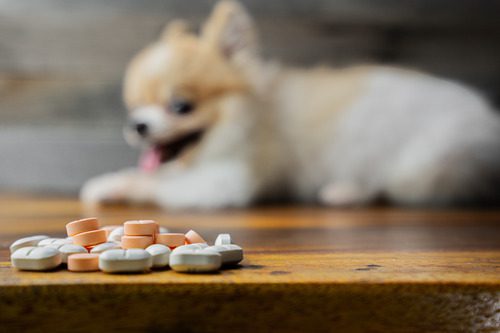Your Dog Ate Tylenol: Is This an Emergency?
If you just discovered that your dog ate Tylenol, you’re likely feeling scared, overwhelmed, and unsure of what to do next. Acetaminophen, which is the active ingredient in Tylenol, can be extremely dangerous to dogs, even in small amounts. This isn’t a situation to monitor passively or wait out. Understanding why Tylenol is toxic to dogs and what can happen after ingestion can help you respond quickly and appropriately. If you’re in Silver Spring, MD and need emergency care or a specialty consultation, contact Apex Vets right away.

Why Tylenol Is Dangerous for Dogs
Acetaminophen is widely used by people to relieve pain and reduce fever, but the effects on dogs can be drastically different. Dogs metabolize medications differently, and substances that are safe for humans can be harmful or even life-threatening to pets.
Small Doses Can Cause Serious Harm
Even a small dose of Tylenol can disrupt a dog’s liver function or interfere with the blood’s ability to carry oxygen. The toxic effects can begin within hours of ingestion, depending on the amount consumed and the size of the dog. The risk increases if the medication contains added ingredients like codeine or caffeine, which may be present in some formulations.
Dogs Lack the Enzymes to Process It Safely
Dogs lack a key enzyme that humans use to break down acetaminophen safely. Because of this, toxins build up quickly in a dog’s system. If your dog ate Tylenol, immediate action is essential.
What Happens When a Dog Eats Tylenol?
Tylenol toxicity can progress rapidly and affect multiple organs. The symptoms and timeline of toxicity may vary depending on the amount ingested and the dog’s weight, age, and health status. Some dogs may begin showing symptoms within a few hours.
Common Signs of Tylenol Toxicity in Dogs
- Lethargy or weakness
- Swelling in the face or paws
- Vomiting or drooling
- Discolored gums (often brown or blue)
- Labored or rapid breathing
- Jaundice (yellowing of the skin or eyes)
- Collapse or seizures
These signs indicate that your dog’s liver or red blood cells may be affected. The presence of any of these symptoms is an emergency. If you’re in Silver Spring, MD and you suspect your dog ate Tylenol, contact Apex Vets immediately.
How Veterinarians Respond to Tylenol Ingestion
When your veterinarian is alerted that a dog ate Tylenol, they assess the situation with urgency. The treatment approach will depend on how much was ingested and how much time has passed.
Diagnostic Steps and Supportive Care
- Bloodwork to evaluate liver function and oxygen levels
- Activated charcoal may be administered to limit absorption if ingestion occurred recently
- IV fluids to support kidney and liver function
- Medications like N-acetylcysteine (NAC), which helps neutralize toxic byproducts
- Oxygen therapy if red blood cell damage has occurred
- Hospitalization for monitoring and continued treatment
Early intervention can significantly improve the outcome. The longer treatment is delayed, the higher the risk of organ damage or death. If you suspect or know your dog ate Tylenol, seeking emergency care is always the right call.
Factors That Affect Risk and Outcome
Not every case of Tylenol ingestion results in the same outcome. Several key factors influence how dangerous the situation becomes:
Size and Weight of the Dog
Smaller dogs are more vulnerable to toxic doses because it takes less acetaminophen to cause harm. A single regular-strength Tylenol tablet (325 mg) could be dangerous for a dog under 20 pounds.
Amount and Type of Tylenol Ingested
Some Tylenol products contain additional ingredients like sleep aids or opioids, which can compound the danger. Extra-strength or extended-release formulations may prolong exposure and increase toxicity.
Timing
The sooner a dog receives care, the better their chances of recovery. Delays in treatment may allow the toxins to fully circulate and cause irreversible damage.
Age and Health Status
Senior dogs, puppies, or dogs with pre-existing liver or kidney issues may experience more severe effects. Their bodies may have less capacity to recover from the toxic impact.
Preventing Accidental Tylenol Ingestion
The best way to protect your dog is to treat human medications as you would toxic substances. Store all medications securely, well out of reach of curious pets. Here are some additional tips:
- Keep purses, backpacks, and countertop items out of reach
- Use pet-proof containers when storing medications
- Never give your dog human medication without veterinary approval
- Be cautious with guests and children who may unknowingly leave pills within reach
Dogs explore the world with their noses and mouths. Even child-proof bottles can be chewed open by a determined pup. Awareness and prevention are key.
What to Do if Your Dog Ate Tylenol
You should never wait to see if symptoms develop. Even if your dog seems fine at the moment, Tylenol can cause internal damage before any outward signs appear. Taking prompt action can mean the difference between recovery and serious illness or worse.
Immediate Steps:
- Remove any remaining pills to prevent further ingestion.
- Check the label of the medication to determine how much was consumed.
- If you’re in Silver Spring and your pet is experiencing an emergency, contact Apex Vets or the pet poison control hotline immediately. Be prepared to provide your dog’s weight, the type and amount of medication ingested, and the time of ingestion.
- Avoid inducing vomiting unless directed by a veterinary professional.
Why You Should Call Apex Vets If You’re in Silver Spring, MD
When emergencies like Tylenol ingestion happen, you need expert care fast. Apex Vets is equipped to handle toxicology cases and other urgent situations that require specialized attention. If your dog ate Tylenol and you’re in the Silver Spring area, our team is here to provide fast, compassionate, and medically advanced support.
Our emergency team will assess your dog, initiate appropriate treatment, and work quickly to minimize any lasting effects. We also offer specialty consultations if follow-up care is needed for liver or kidney support.
